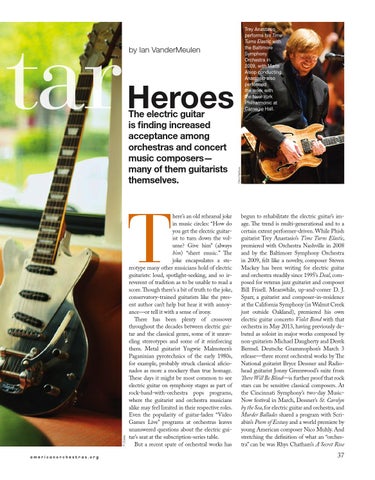tar
by Ian VanderMeulen
The electric guitar is finding increased acceptance among orchestras and concert music composers— many of them guitarists themselves.
PJ Sykes
here’s an old rehearsal joke in music circles: “How do you get the electric guitarist to turn down the volume? Give him” (always him) “sheet music.” The joke encapsulates a stereotype many other musicians hold of electric guitarists: loud, spotlight-seeking, and so irreverent of tradition as to be unable to read a score. Though there’s a bit of truth to the joke, conservatory-trained guitarists like the present author can’t help but hear it with annoyance—or tell it with a sense of irony. There has been plenty of crossover throughout the decades between electric guitar and the classical genre, some of it unraveling stereotypes and some of it reinforcing them. Metal guitarist Yngwie Malmsteen’s Paganinian pyrotechnics of the early 1980s, for example, probably struck classical aficionados as more a mockery than true homage. These days it might be most common to see electric guitar on symphony stages as part of rock-band-with-orchestra pops programs, where the guitarist and orchestra musicians alike may feel limited in their respective roles. Even the popularity of guitar-laden “Video Games Live” programs at orchestras leaves unanswered questions about the electric guitar’s seat at the subscription-series table. But a recent spate of orchestral works has
Chris Hartlove
Heroes
T
americanorchestras.org
Trey Anastasio performs his Time Turns Elastic with the Baltimore Symphony Orchestra in 2009, with Marin Alsop conducting. Anastasio also performed the work with the New York Philharmonic at Carnegie Hall.
begun to rehabilitate the electric guitar’s image. The trend is multi-generational and to a certain extent performer-driven. While Phish guitarist Trey Anastasio’s Time Turns Elastic, premiered with Orchestra Nashville in 2008 and by the Baltimore Symphony Orchestra in 2009, felt like a novelty, composer Steven Mackey has been writing for electric guitar and orchestra steadily since 1995’s Deal, composed for veteran jazz guitarist and composer Bill Frisell. Meanwhile, up-and-comer D. J. Sparr, a guitarist and composer-in-residence at the California Symphony (in Walnut Creek just outside Oakland), premiered his own electric guitar concerto Violet Bond with that orchestra in May 2013, having previously debuted as soloist in major works composed by non-guitarists Michael Daugherty and Derek Bermel. Deutsche Grammophon’s March 3 release—three recent orchestral works by The National guitarist Bryce Dessner and Radiohead guitarist Jonny Greenwood’s suite from There Will Be Blood—is further proof that rock stars can be sensitive classical composers. At the Cincinnati Symphony’s two-day MusicNow festival in March, Dessner’s St. Carolyn by the Sea, for electric guitar and orchestra, and Murder Ballades shared a program with Scriabin’s Poem of Ecstasy and a world premiere by young American composer Nico Muhly. And stretching the definition of what an “orchestra” can be was Rhys Chatham’s A Secret Rose
37
